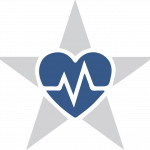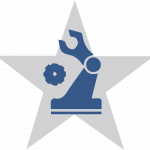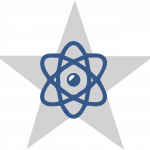High School Credit CTE Courses Offered in Junior High
Not sure which class to choose? Take a Career Interest Survey...
Did you know that junior high students can earn high school credits for certain career and technical education (CTE) classes?
Taking a CTE class in junior high can not only give students a head start on earning credits that count towards the 26 credit graduation requirement, but it can also give students a head start on their future careers! When students take a CTE course in junior high, it allows them to explore their areas of interest to determine whether or not they want to continue in a program of study when they enter high school. We have many available opportunities in Richardson ISD for students to start exploring various careers. Contact your campus to find out which of these course options are available in your learning community.
Applicable to All Career Clusters
College & Career Readiness (CCR) STEM Lab
The College, Career Readiness CTE/STEM lab course provides students the opportunity to explore all of the career training opportunities available in RISD. Through hands-on, real world activities, students are able to affirm their interest in a future career. RISD connects students to their future by preparing them for the world of work. Students will master the essential skills necessary for workplace success while investigating the multitude of job opportunities within various industries. While exploring fields such as architecture, construction, law, healthcare, business and marketing, finance, education, cosmetology, animation and video production, engineering and robotics, and so many more, students will utilize google suite platforms, develop communication and leadership skills, and utilize time management, self-motivation, problem-solving and resilience. This course is an introduction to the engaging programs at the junior high and high school levels. It is a jumpstart to their future.
Architecture & Construction Cluster

Introduction to Architecture & Construction
Introduction to Architecture & Construction introduces students to the specific architectural computer aided design and drafting (CADD) software and equipment required to produce architectural working drawings and construction documents. (1.0 high school credit)
Arts, Audio Video Technology & Communications Cluster

Principles of Arts, Audio Video Technology & Communications
This course is an introductory course that gives the students a general overview of the various and multifaceted career opportunities in the arts, audio/video and communications industry. Students will be provided experiences in the following areas of instruction: Communications strategies, technology applications (email, writing, publishing, presentation, spreadsheet, database), safety regulations, ethical conduct, leadership, career opportunities, group/teamwork activities, equipment usage, formal and informal professional presentations. Various software will be available for the student including ISM (Independent Student Media) from Hollywood, California. (1.0 high school credit)
Business, Marketing & Finance Cluster

Principles of Business, Marketing & Finance
Students gain knowledge and skills in the different aspects of the business world. Components of the course include the role of business in a global society, business ethics, economic systems, organized labor, costs and profits in finance, sales process, advertising, personal finance, and career opportunities. (1.0 high school credit)
Education & Training Cluster

Principles of Education & Training
This course is designed for students to gain an understanding of the basic knowledge and skills essential to careers within the education and training career cluster. Students complete career investigations in education, administration, and support services. The student also explores options in the various fields of education based on interest area and explores the different levels of education-elementary, secondary, and post-secondary. (1.0 high school credit)
Health Science Cluster

Medical Terminology
The Medical Terminology course is designed to introduce students to the structure of medical terms, including prefixes, suffixes, word roots, singular and plural forms, and medical abbreviations. The course allows students to achieve comprehension of medical vocabulary appropriate to medical procedures, human anatomy and physiology, and pathophysiology. (1.0 high school credit)
Hospitality Cluster

Principles of Hospitality, Tourism & Culinary
This is an introductory course for the Hospitality and Culinary Arts industry. Components of the course include time management, teamwork skills, job safety, roles in the industry, food production, healthy food choices, nutrition, sanitation, basic skills and techniques involved in basic cookery while exploring career opportunities in the food service industry. (1.0 high school credit)
Human Services Cluster

Principles of Cosmetology, Design & Color Theory
In Principles of Cosmetology Design and Color Theory, students coordinate integration of academic, career, and technical knowledge and skills in this laboratory instructional sequence course designed to provide job-specific training for employment in cosmetology careers. Instruction includes sterilization and sanitation procedures, hair care, nail care, and skin care and meets the TDLR requirements for licensure upon passing the state examination. (1.0 high school credit)
Law & Public Safety Cluster

Principles of Law, Public Safety, Corrections & Security
This course introduces students to professions in law enforcement, security, corrections, and fire and emergency services. Components of the course include safety, legal responsibilities, interagency cooperation, philosophical development of criminal law, roles of the professional, roles and functions of court systems, roles and functions of the correctional system, and roles and functions of private security agencies and fire protection services. (1.0 high school credit)
Manufacturing Cluster

Principles of Applied Engineering
This course provides students with an introductory overview into the various fields of science, engineering, mathematics, as related to robotic and technology systems. Major components include design software, safety, identification of tools and usage, teamwork, system modeling and designs, controls, basic automation systems, applications and relations in physical and mechanical systems, process control systems, culminating in a team-based project while assuming different roles as a team member, maintaining an engineering notebook, testing, and presenting the project. (1.0 high school credit)
STEM Cluster

Fundamentals of Computer Science
This course is designed as an entry-level course for those students just beginning the study of computer science. Students will foster their creativity and innovation skills through opportunities to design, implement, and present solutions to real world problems. Students will create interactive stories, games, animations, algorithms, web pages, and effective user interfaces. Students will learn digital citizenship by researching current laws and regulations by practicing integrity and respect. Students also will gain an understanding of the principles of computer science through the study of technology operations and concepts. (1.0 high school credit)
Transportation, Distribution & Logistics Cluster

Principles of Automotive Technology
In Principles of Automotive Technology, students will gain knowledge and skills in the safe application, design, production, and assessment of products, services, and systems. This knowledge includes the history, laws and regulations, and common practices used in the transportation industry. Students should apply knowledge and skills in the application, design, and production of technology as it relates to the transportation industries. This course allows students to reinforce, apply, and transfer their academic knowledge and skills to a variety of interesting and relevant activities, problems, and settings. (1.0 high school credit)